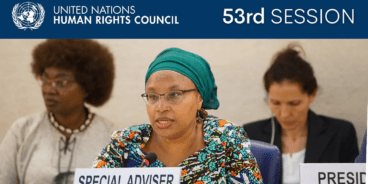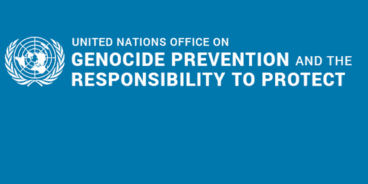
Statement by the UN Special Adviser on the Prevention of Genocide on his visit to the region of the Western Balkans, February 2018
(Sarajevo, 12 February 2018) – United Nations Special Adviser on the Prevention of Genocide Adama Dieng concluded today a twelve-day visit to the region of the Western Balkans. The visit included Croatia, Montenegro, Serbia and Bosnia and Herzegovina. In these four States, the Special Adviser met high level government officials, including cabinet members, heads of parliament and national prosecutors; religious leaders; representatives of civil society organizations as well as members of the diplomatic community. Special Adviser Dieng also held meetings with representatives of the United Nations Country Teams in the region and the United Nations Office in Belgrade.
In Bosnia and Herzegovina, where he placed a special focus in light of the upcoming October 2018 general elections and the increase in political tensions, the Special Adviser met government officials at State and entity levels in Sarajevo and in Banja Luka. They included, among others, members of the Bosnia and Herzegovina Presidency Ivanić and Izetbegović; Minister of Foreign Affairs Crnadak; Minister for Human Rights and Refugees Borovac; Republika Srpska entity President Dodik; and Federation of Bonia and Herzegovina entity President Čavara. He also met members of the Speakers Collegium of both parliamentary chambers. Special Adviser Dieng paid tribute to the victims of past atrocity crimes with visits to memorial sites in Srebrenica and in Donja Gradina. He also visited the Partisan Memorial Cemetery in Mostar.
In the four States, the Special Adviser explored existing challenges for reconciliation as well as opportunities to overcome them. He expressed concern at the presence of a number of factors that could lead to scenarios of further polarization unless serious and concerted efforts are taken to address them, primarily by political leaders but also by civil society actors and by the international community. Concerns include political polarization across identity lines and politicization of events in the past, including glorification of war criminals, contestation of court decisions and limited engagement in transitional justice and national reconciliation. He also expressed concern at the absence of shared narrative of events in the past and what he considered as limited political interest in promoting such understanding.
Special Adviser Dieng called on political leaders to take active steps to overcome divisions and to maximize common ground. He specifically encouraged them to overcome existing trust deficits by focusing on the future and by prioritizing reconciliation as a fundamental policy objective for the region. This includes strengthening efforts to advance transitional justice and accountability agendas by expediting implementation of legislation addressing genocide denial, glorification of war crimes and hate speech, as well as by harmonizing domestic provisions on civilian victims of atrocity crimes, among others. He appealed for recognition of the suffering of all victims irrespective of their ethnic or religious origin, including through joint participation by political leaders in memorialization events. He praised the courage of victims’ associations in advancing accountability in the region. He also underlined the important role of religious leaders and actors in promoting reconciliation, as well as the importance of empowering the youth with sustained efforts to promote inclusive education.
In his meetings with government officials, the Special Adviser also encouraged further strengthening joint agendas in fields where cooperation already exists. These include prosecution of war crimes and regionalization of the joint United Nations and Bosnia and Herzegovina Presidency Dialogue for the Future initiative. He also shared the view that the implementation of the 2030 Sustainable Development Agenda, particularly Sustainable Development Goal 16, constitutes a key instrument for prevention as it addresses drivers and root causes of instability and conflict.
In his meetings with representative of the diplomatic community in the region, Special Adviser Dieng called for concerted and sustained efforts to prioritize reconciliation and prevention. This is particularly important in light of ongoing efforts by Western Balkan States to achieve European Union membership. This organization’s renewed focus on this region provides a new opportunity for prioritization of the reconciliation agenda. Special Adviser Dieng intends to further emphasize this message in his bilateral interactions with relevant Member States.
